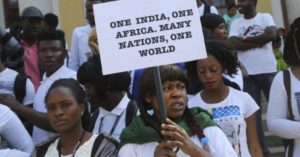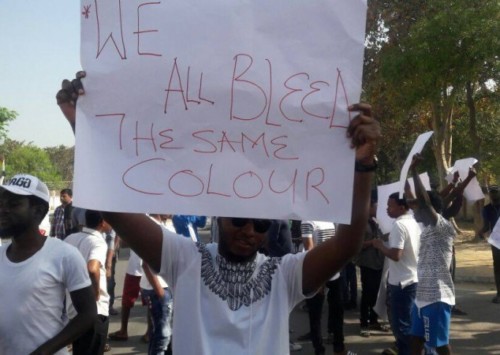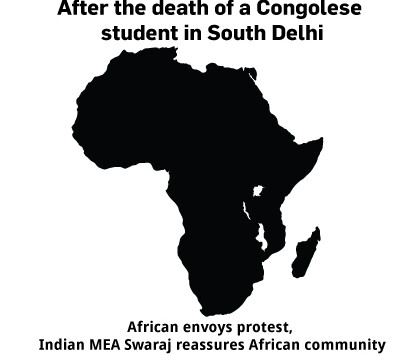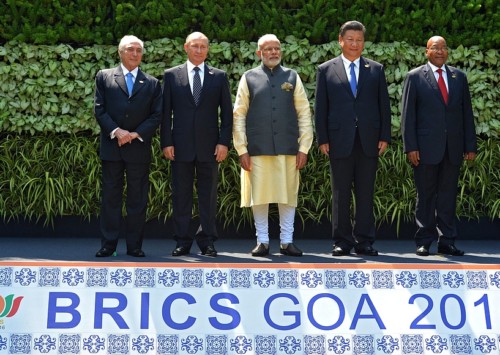Inaction by India escalates Africans attack row

A picture from a protest from last year when a Tanzanian woman was attacked in Bengaluru. Many such incidents have occurred in India recently. Photo Credit: PTI
A meeting of envoys of African countries has led to a call for investigation from international human rights bodies as India’s redressal measures yet remain inadequate in response to the Greater Noida attack on African students.
After the death of a local youth, a residential area in Greater Noida last week was buzzing with rumours of Nigerian students being behind the death. Following this, attacks on the African students ensued and a series of such incidents occurred which has led to a widespread debate on India’s racist tendencies in the treatment of African nationals. Even as there were condemnations and statements issued by the Indian government after the attack, these have remained insufficient, as the African envoys’ meeting points out. The possibility of an escalation bringing in human rights bodies such as the United Nations Human Rights Council has been explored, which was proposed as the actions undertaken by the Indian government have been viewed as unsatisfactory.
A meeting of African Heads of Mission, which constituted 54 countries of the continent of Africa outlined “As regards the recent unfortunate incident in Greater Noida, the African Heads of Mission strongly condemn the incident and express their deep concern and also take note that these reprehensible events, both outstanding and unresolved cases against Africans, were not sufficiently condemned by the Indian authorities.” There was a unanimous agreement that “those accumulated attacks against Africans are xenophobic and racial in nature.” Upon a review of the attacks and historical occurrences of a similar nature upon African nationals, the envoys concluded “no known, sufficient and visible deterring measures were taken by the Government of India.”
Further actions were explored, which primarily included the “call for an independent investigation by the Human Rights Council as well as other human rights bodies and also to comprehensively report the matter to the African Union Commission,” proposed upon the incidence of failure of the Indian government to enforce legal action against perpetrators. The statement also expressed the expectation “for strong condemnation from the highest political level (both nationally and locally) of the Government of India” the statement said.
In response to the strong worded statement, India’s Ministry of External Affairs expressed “It is unfortunate that a criminal act triggered following the untimely death of Indian student has been termed xenophobic and racial. Investigations are ongoing.”
Refusing to accept the racial nature of the attacks, the MEA assured that local authorities had arrested suspects and the government had condemned and described the attack as unacceptable. The MEA alleged the statement having been issued only by the Eritrean ambassador, who is also the dean of the African heads of missions, “apparently issued on their behalf.”
Diplomatic challenge
Despite China’s advancing investments and growing interests in Africa, making it an extremely important partner from South Asia, India has tried catching up. Even as India has been increasingly enthusiastic in deepening economic ties with countries in the African continent, repeated incidents that undoubtedly reveal its society’s racist tendencies can go a long way in souring relations. India and Nigeria, whose nationals were the most recent ones to be attacked, are close on crude oil as India remains Nigeria’s biggest importer.
The Association of African Students in India (AASI), had also expressed intent to lodge a formal complaint with the African Union following the attacks, which outlined severing bilateral trade ties as a threat that would be undertaken upon inaction. If the African envoys’ meeting and consequent remarks haven’t stirred India to address the longstanding issue yet, perhaps only an international investigation can wake it up from its deep slumber of denial.












